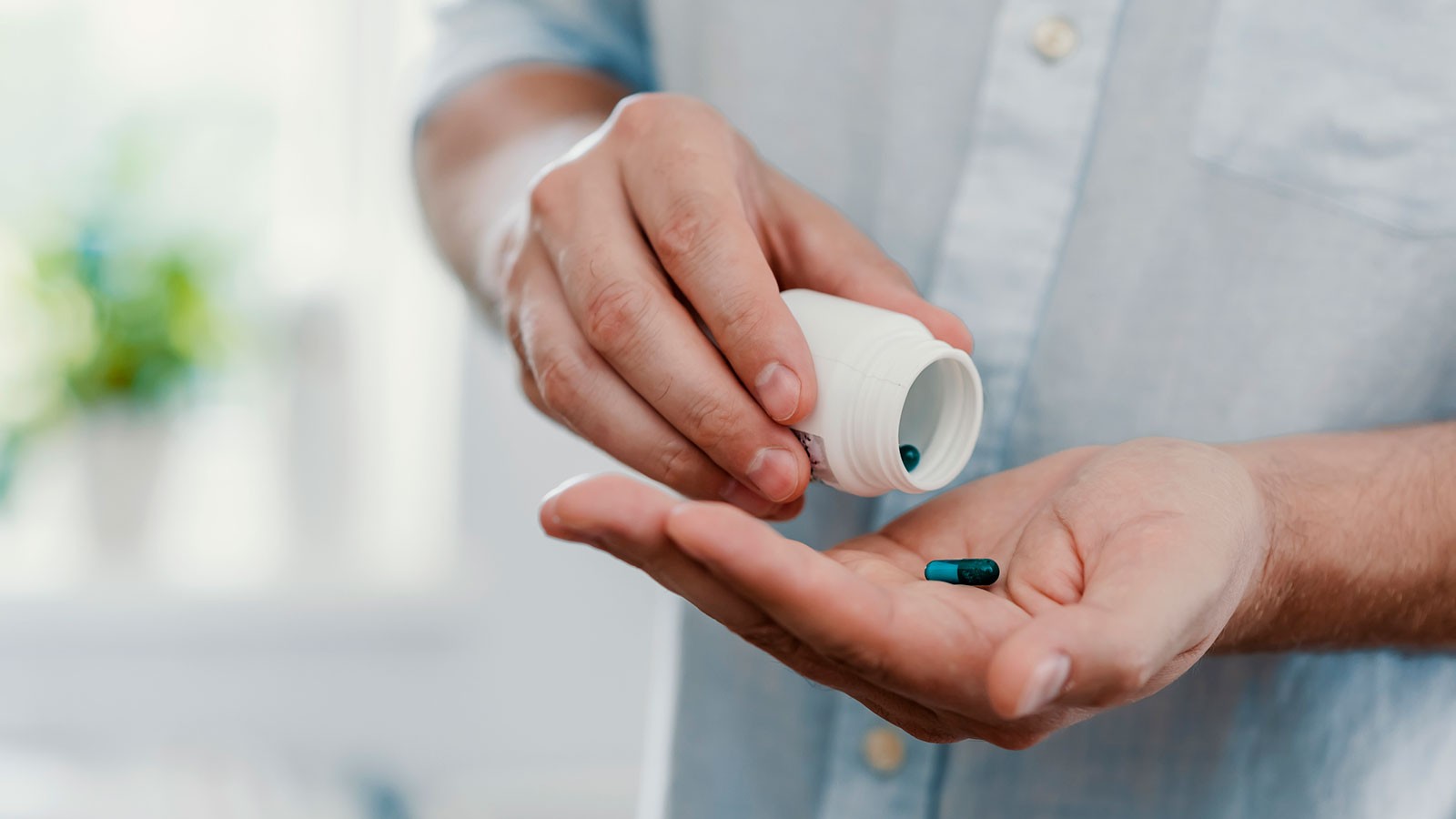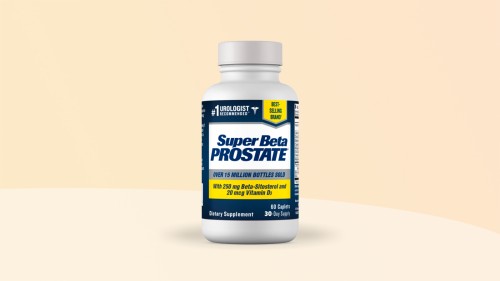Do Supplements Help with BPH? A Dietitian Explains
Last Updated on April 14, 2021
Medically Reviewed by Anthony Dugarte, MD
Are supplements a good way to help relieve uncomfortable symptoms of BPH? There are a few ingredients that might be worth a try to improve symptoms.


Choosing the best prostate health supplement can feel overwhelming.
Navigating the various claims made by prostate supplement companies and knowing which prostate supplement may be best for you can also be confusing.
If you’ve been diagnosed with BPH, you are not alone. Benign prostatic hyperplasia (BPH), also called prostate gland enlargement, is the most common age-related prostate condition.
While the condition isn’t life-threatening, the symptoms of BPH can be burdensome, interfere with an individual’s quality of life, and gradually worsen over time,
As the prostate enlarges, the bladder may weaken and lose its ability to fully empty, leaving some urine in the bladder.
The inability to empty the bladder fully causes many of the symptoms associated with BPH. Common signs and symptoms of BPH include:
- Urgent or frequent need to urinate
- Increased frequency of nighttime urination (nocturia)
- Struggling starting urination
- Weak urine stream
- Inability to completely empty the bladder
Oftentimes, your doctor will suggest a prescription drug as a treatment option for BPH.
Although generally effective, these various drugs also come with adverse side effects. This is why many men are turning to supplements for relief from their BPH symptoms. (1)
While supplements cannot completely treat or cure BPH, some research suggests that they may help ease symptoms associated with an enlarged prostate.
Prostate supplements generally utilize plant-based ingredients to decrease prostate enlargement in hopes of producing a stronger urine stream and to promote fully emptying of the bladder when urinating.
Many supplements used for prostate health contain proprietary formulas, meaning they use a blend of ingredients made exclusively for only one manufacturer.
These proprietary formulas allow manufacturers to withhold important information about the amount of each ingredient in the formula.
This makes it extremely difficult to examine and analyze prostate supplements and compare them to other products.
Effectiveness of Popular Ingredients in BPH Supplements
Saw Palmetto
Saw palmetto is one the most popular herbal supplements used to treat the symptoms of BPH.
Studies indicate that saw palmetto, made from the berries of a plant called the dwarf palm, may help alleviate some of the symptoms of BPH by reducing the size of the inner lining of the prostate. (2)
Moreover, a recent review of the literature suggests that saw palmetto is not only safe but, due to its strong evidence base, can be recommended as first-line therapy in men with mild to moderate symptoms of BPH. (3)
The effective dose of saw palmetto used in most trials is 320 mg per day.
Due to the common use of proprietary blends in the prostate supplement market, it may be difficult to know exactly how much saw palmetto is in a particular supplement.
Beta-Sitosterol and Other Plant Sterols
Beta-sitosterol, along with other plant sterols, is often found in prostate health supplements to treat symptoms of BPH.
Clinical studies using plant sterols to treat urinary symptoms associated with BPH have had encouraging results. (4)
A recent clinical study found that phytosterol-enriched saw palmetto was effective in the management of symptomatic BPH. (5)
Pygeum (African Plum Extract)
The bark of this African tree has been used in traditional medicine for centuries to treat various urinary problems.
A 2012 study indicates that pygeum may help slow the growth of prostate cells, which may help prevent the development of BPH. (6)
A more recent study notes that the efficacy of pygeum is still somewhat uncertain, with further well-designed clinical trials needed to confirm its benefit for BPH symptoms. (7)
Stinging Nettle
Stinging nettle is a popular herbal remedy that may have compounds that help with the management of BPH.
One study found that a daily dose of 120 mg of stinging nettle improved urinary flow and bladder emptying in elderly men diagnosed with BPH. (8)
In another study, researchers found that stinging nettle (300mg each, 2 times a day) had a better effect in relieving clinical symptoms in BPH patients compared to placebo. (9)
Stinging nettle is sometimes used in combination with saw palmetto to enhance the effectiveness of both compounds.
Looking for this combination may be helpful in finding the best prostate supplement for you.
Pumpkin Seed Oil
Pumpkin seed oil is anti-inflammatory and full of vitamins; preliminary studies show it may be helpful in promoting urinary health.
One study examined the effects of 320 mg of pumpkin seed oil and 320 mg of saw palmetto on 47 men with BPH. (10)
Researchers found that pumpkin seed oil and saw palmetto oil are both safe and may be effective as a treatment option for men with BPH.
Larger scale studies are needed to confirm these benefits, but pumpkin seed oil, combined with saw palmetto oil, is safe and may help ease symptoms of BPH.
Pine Bark Extract
Pine bark extract is another ingredient you may find in prostate health supplements.
One recent study showed that common BPH symptoms like difficulty emptying the bladder, urination frequency and urgency, weak flow, and frequent nighttime urination were significantly improved with pine bark extract. (11)
Larger-scale studies are needed to conclude that pine bark extract is an effective treatment option for men with BPH.
Zinc
Zinc plays a vital role in the development and normal functioning of the prostate. According to one study, being deficient in zinc may place men at a higher risk of having BPH. (12)
However, more research is needed to determine if zinc supplementation can reduce the symptoms of BPH.
Vitamin D
There has been some research suggesting vitamin D deficiency may be linked to prostate health.
One study found that vitamin D deficiency may be a risk factor for the development of BPH. (13)
Additionally, vitamin D may offer relief from symptoms of BPH. One review of the research found that high doses (6000 IU) may decrease the prostate size in men with BPH. (14)
Safety Concerns
While generally considered safe, it is important to know that prostate supplements do carry some health risks.
Taking Supplements May Mask an Underlying Health Issue
While BPH is the most common cause of frequent urination or urinary pain in men, there are other causes that may be more serious.
For example, prostatitis is an infection in the prostate that has similar symptoms to BPH but requires antibiotics.
If you’re experiencing any urinary symptoms, it’s important to talk with your health care provider to rule out anything more serious before taking any supplement.
Questionable Ingredients
Dietary supplements aren’t regulated the same way prescription drugs are.
Supplement manufacturers are not required to prove that their products are safe, effective, or accurately labeled.
Furthermore, when a product claims to have a unique and effective “proprietary blend” of ingredients, be aware that the manufacturer will not provide the dosage of the ingredients in this blend.
Therefore, evaluating the product for effectiveness and safety becomes that much more difficult.
Side Effects
The side effects of taking prostate supplements are generally mild.
The plant sterols found in supplements for enlarged prostate may cause digestive symptoms, including diarrhea, nausea, and indigestion.
Natural Remedies for Enlarged Prostate
The following are steps you can take to control the symptoms of BPH without the use of medications or supplements:
Reduce caffeine and alcohol intake. They can increase urine production, increase bladder irritation, and exacerbate symptoms.
Don’t delay urinating. Go when you first feel the urge as waiting too long can stretch the bladder muscle and cause damage.
Don’t drink before bedtime. Don’t drink an hour or two before bedtime to avoid nighttime trips to the bathroom.
Try to stay active. Research suggests that men who are more physically active are less likely to experience prostate complications. Even a small amount of exercise can help reduce symptoms of BPH. (15)
Increase fruit and vegetable intake. Studies suggest that eating more fruits and vegetables may decrease your risk of developing BPH. (16)
Before spending your money on supplements, consider adopting a healthier lifestyle to see if your symptoms improve.
The Bottom Line
There are many different supplements on the market that are touted as a treatment option for symptoms of BPH.
Studies on some of the ingredients in BPH supplements show promising results.
Unfortunately, many of the studies are small in scale and short-term. This makes it difficult to know the true benefits of these products, particularly with long-term use.
Another challenge in evaluating prostate health supplements is the lack of standardization in most products, meaning that the dosage of ingredients may vary considerably.
Meanwhile, the safety record for many prostate supplements is positive, and while small-scaled, some of the research is promising.
When searching for the best prostate supplements, look for products that have been third-party certified by organizations like NSF International or United States Pharmacopeia (USP).
It’s also important to discuss any prostate symptoms you may be experiencing with your health care provider to rule out something more serious and to discuss whether prostate supplements are right for you.
A Word from Our RD
Increasing your fruit and vegetable intake may decrease your risk of developing BPH.
Additionally, there are specific foods that may not only reduce your risk of developing BPH but may also help to improve symptoms. These foods include:
- Cauliflower
- Broccoli
- Berries (strawberries, raspberries, and blackberries)
- Salmon
- Tomatoes
- Pumpkin seeds
Limiting your intake of certain foods may help reduce BPH symptoms. These foods include:
- Red meat
- Full-fat dairy
- Spicy foods
At WellnessVerge, we only use reputable sources, including peer-reviewed medical journals and well-respected academic institutions.
- Efficacy and Side Effects of Drugs Commonly Used for the Treatment of Lower Urinary Tract Symptoms Associated With Benign Prostatic Hyperplasia:
https://www.ncbi.nlm.nih.gov/pmc/articles/PMC7225336/ - Nutrition and benign prostatic hyperplasia:
https://www.semanticscholar.org/paper/Nutrition-and-benign-prostatic-hyperplasia-Espinosa/3af2cba5d0c864e798333b719f0dcb9d49611894?p2df - Efficacy and safety of a hexanic extract of Serenoa repens (Permixon ® ) for the treatment of lower urinary tract symptoms associated with benign prostatic hyperplasia (LUTS/BPH): systematic review and meta-analysis of randomised controlled trials and observational studies:
https://pubmed.ncbi.nlm.nih.gov/29694707/ - Dietary supplements for benign prostatic hyperplasia: an overview of systematic reviews:
https://pubmed.ncbi.nlm.nih.gov/22883375/ - A double blind, placebo-controlled randomized comparative study on the efficacy of phytosterol-enriched and conventional saw palmetto oil in mitigating benign prostate hyperplasia and androgen deficiency:
https://bmcurol.biomedcentral.com/articles/10.1186/s12894-020-00648-9 - Biological effect of human serum collected before and after oral intake of Pygeum africanum on various benign prostate cell cultures:
https://www.ncbi.nlm.nih.gov/pmc/articles/PMC3720175/ - Biological effect of human serum collected before and after oral intake of Pygeum africanum on various benign prostate cell cultures:
https://www.canjurol.com/html/free-articles/JUV22I5S1F_08_DrLowe.pdf - Efficacy and safety of a combination of Sabal and Urtica extract in lower urinary tract symptoms--long-term follow-up of a placebo-controlled, double-blind, multicenter trial:
https://pubmed.ncbi.nlm.nih.gov/18038253/ - The Efficacy of Stinging Nettle (Urtica Dioica) in Patients with Benign Prostatic Hyperplasia: A Randomized Double-Blind Study in 100 Patients:
https://www.ncbi.nlm.nih.gov/pmc/articles/PMC3589769/ - Effects of pumpkin seed oil and saw palmetto oil in Korean men with symptomatic benign prostatic hyperplasia:
https://www.ncbi.nlm.nih.gov/pmc/articles/PMC2809240/ - Benign prostatic hypertrophy: Pycnogenol® supplementation improves prostate symptoms and residual bladder volume:
https://www.minervamedica.it/en/journals/minerva-medica/article.php?cod=R10Y2018N04A0280 - Zinc Deficiency in Men Over 50 and Its Implications in Prostate Disorders:
https://www.frontiersin.org/articles/10.3389/fonc.2020.01293/full - VITAMIN D LEVELS IN PATIENTS WITH BENIGN PROSTATIC HYPERPLASIA:
https://www.researchgate.net/publication/335976573_VITAMIN_D_LEVELS_IN_PATIENTS_WITH_BENIGN_PROSTATIC_HYPERPLASIA - Vitamin D and benign prostatic hyperplasia -- a review:
https://pubmed.ncbi.nlm.nih.gov/23930605/ - Physical Activity and Prostate Cancer: An Updated Review:
https://pubmed.ncbi.nlm.nih.gov/27844337/ - Fruit and vegetable consumption, intake of micronutrients, and benign prostatic hyperplasia in US men.:
https://www.unboundmedicine.com/medline/citation/17284753/full_citation






